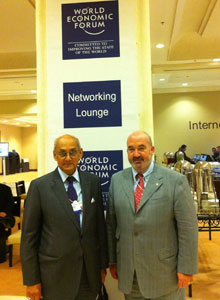ROTARY INTERNATIONAL NEWS:
Rotary Leaders Attend World Economic Forum Events
RI President Kalyan Banerjee and General Secretary John Hewko represented Rotary at World Economic Forum events in Jordan and India, underscoring Rotary's commitment to economic and community development, one of the areas of focus.
 The World Economic Forum, founded in 1971, brings together world leaders in business, politics, and academia to discuss global issues, including the economy, health, and the environment.
The World Economic Forum, founded in 1971, brings together world leaders in business, politics, and academia to discuss global issues, including the economy, health, and the environment.
Banerjee attended a World Economic Forum meeting at the Dead Sea in Jordan, 21-23 October, that focused on human development, job creation, and water issues in the Arab world. He says his participation "helped me represent Rotary to the various kings, queens, prime ministers, and dignitaries from all over the world.
"I hope the World Economic Forum will be receptive to strengthening its ties to Rotary," he says. "These are very important meetings which we should continue to strive to participate in."
At Banerjee's request, Hewko joined government and business leaders from the United States and India in a panel discussion at the India Economic Summit in Mumbai, 12-14 November. He spoke on Rotary's role in addressing skill development through educational initiatives.
"We have been tackling this problem on many levels," Hewko said. "Just building schools and making them accessible isn't enough. In order to benefit from them, children need a healthy, stable, economically secure home environment. This means looking at water, sanitation, and health."
In an article published in the Hindu Business Line during the summit, Hewko wrote about how Rotary's efforts to eradicate polio will contribute directly to India's economic growth.
"For one, [the eradication effort] will leave in place improved infrastructure and delivery systems that can be adapted to address other pressing public health needs crucial to development," Hewko wrote. "In strictly monetary terms, if polio is eradicated globally within the next few years, the world's total investment in the effort -- now at more than [US]$8 billion -- will yield benefits estimated at $40-50 billion through 2035, according to a study published last year in the journal Vaccine . Most of the benefits will accrue in countries where polio lingered the longest."
